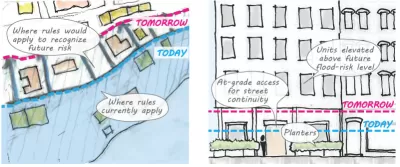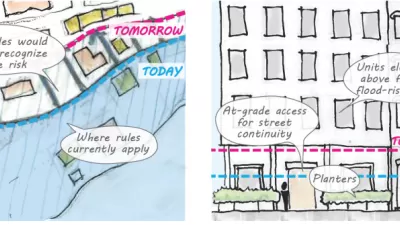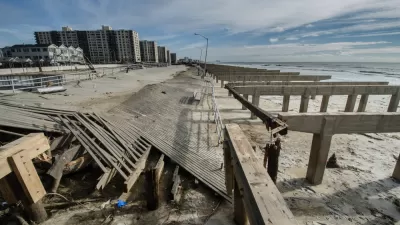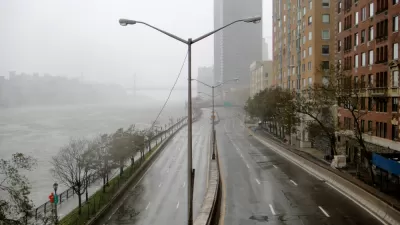With 520 miles of coastline, New York City is ready to implement the lessons of Hurricane Sandy in the zoning code for the entire city.

New York Department of City Planning is seeking public input on a citywide rezoning designed to improve resilience during flood events. The new zoning rules are proposed in the Zoning for Coastal Flood Resiliency (ZCFR) process, according to a press release from the Department of City Planning.
According to the ZCFR website, "Zoning for Coastal Flood Resiliency would improve homeowners’ and business owners’ ability to withstand and recover from future storms and other disaster events. It builds on years of collaboration with floodplain communities to support post-disaster recovery and promote long-term resiliency."
The zoning changes proposed by the ZCFR process would update temporary zoning changes implemented after Hurricane Sandy in 2012, according to the same web page.
"The proposal would allow homeowners, business owners, architects and others to design resilient buildings that are better protected from flood risk and reduce flood insurance costs. It would protect and support public access to waterfront sites through resilient open space design. It would also help New Yorkers recover quickly from other future disasters, including the COVID-19 crisis," according to the website.
New York City Planning Commission Chair Marisa Lago is quoted in the press release with the following soundbite: "This new zoning also provides needed flexibility to address all types of future disasters, whether another climate event or today’s COVID-19 pandemic."
"Currently, buildings are restricted by zoning regulations that do not take resiliency into account and thus force New Yorkers to choose between interior space and resiliency improvements. ZCFR will make it easier for buildings to meet or exceed modern resiliency codes without sacrificing their basement, for example, by adding some much-needed zoning flexibility," reads the press release.
In one crucial component of the rezoning, the changes would limit the construction of new nursing homes in areas of high flood risk.
FULL STORY: Making NYC More Resilient: Public Review Begins for DCP’s Important Zoning for Coastal Flood Resiliency

Study: Maui’s Plan to Convert Vacation Rentals to Long-Term Housing Could Cause Nearly $1 Billion Economic Loss
The plan would reduce visitor accommodation by 25,% resulting in 1,900 jobs lost.

North Texas Transit Leaders Tout Benefits of TOD for Growing Region
At a summit focused on transit-oriented development, policymakers discussed how North Texas’ expanded light rail system can serve as a tool for economic growth.

Using Old Oil and Gas Wells for Green Energy Storage
Penn State researchers have found that repurposing abandoned oil and gas wells for geothermal-assisted compressed-air energy storage can boost efficiency, reduce environmental risks, and support clean energy and job transitions.

Private Donations Propel Early Restoration of Palisades Playground
Los Angeles has secured over $1.3 million in private funding to restore the Pacific Palisades playground months ahead of schedule, creating a modern, accessible space that supports community healing after recent wildfires.

From Blight to Benefit: Early Results From California’s Equitable Cleanup Program
The Equitable Community Revitalization Grant (ECRG) program is reshaping brownfield redevelopment by prioritizing projects in low-income and environmental justice communities, emphasizing equity, transparency, and community benefits.

Planting Relief: Tackling Las Vegas Heat One Tree at a Time
Nevada Plants, a Las Vegas-based nonprofit, is combating the city’s extreme urban heat by giving away trees to residents in underserved neighborhoods, promoting shade, sustainability, and community health.
Urban Design for Planners 1: Software Tools
This six-course series explores essential urban design concepts using open source software and equips planners with the tools they need to participate fully in the urban design process.
Planning for Universal Design
Learn the tools for implementing Universal Design in planning regulations.
Ascent Environmental
Borough of Carlisle
Institute for Housing and Urban Development Studies (IHS)
City of Grandview
Harvard GSD Executive Education
Toledo-Lucas County Plan Commissions
Salt Lake City
NYU Wagner Graduate School of Public Service





























